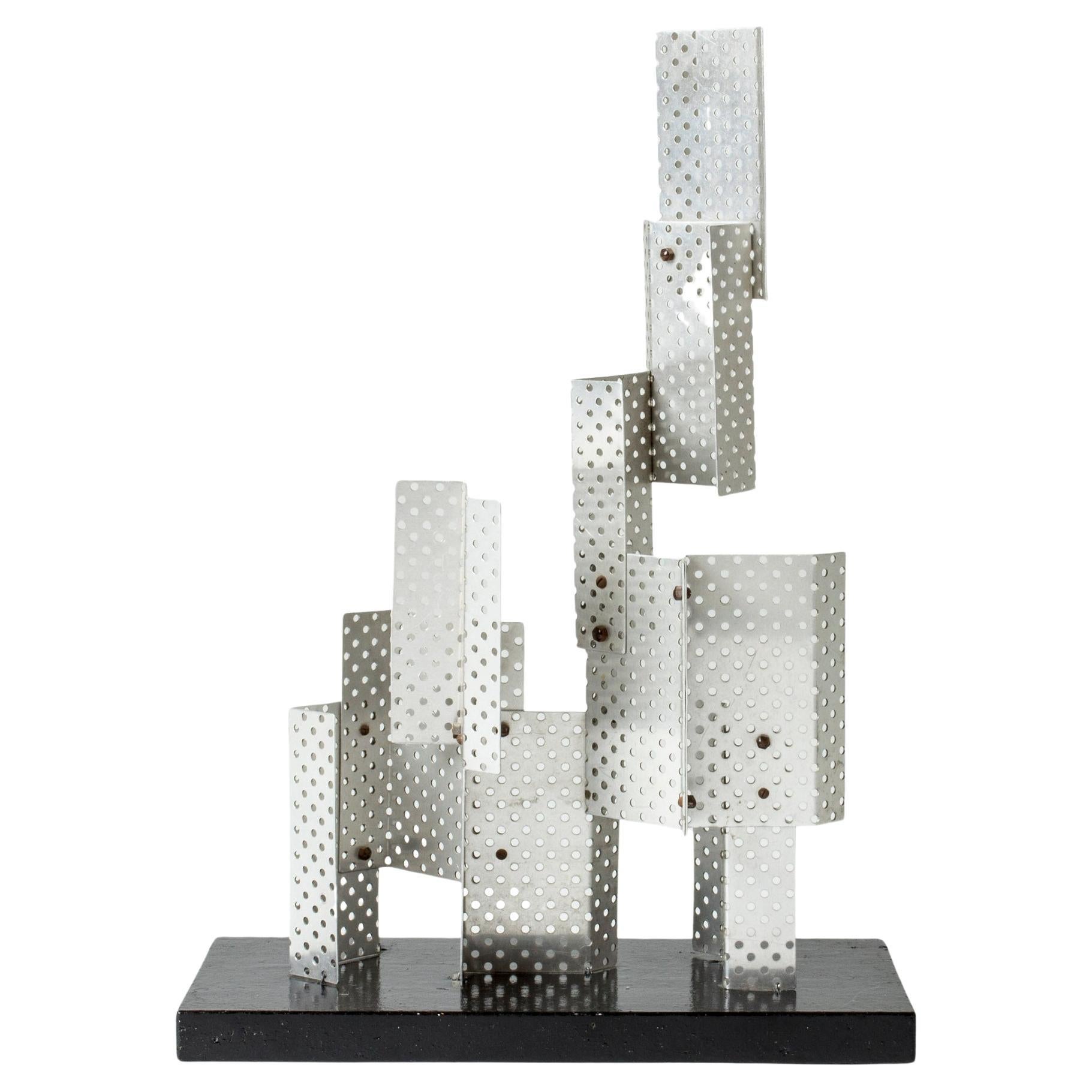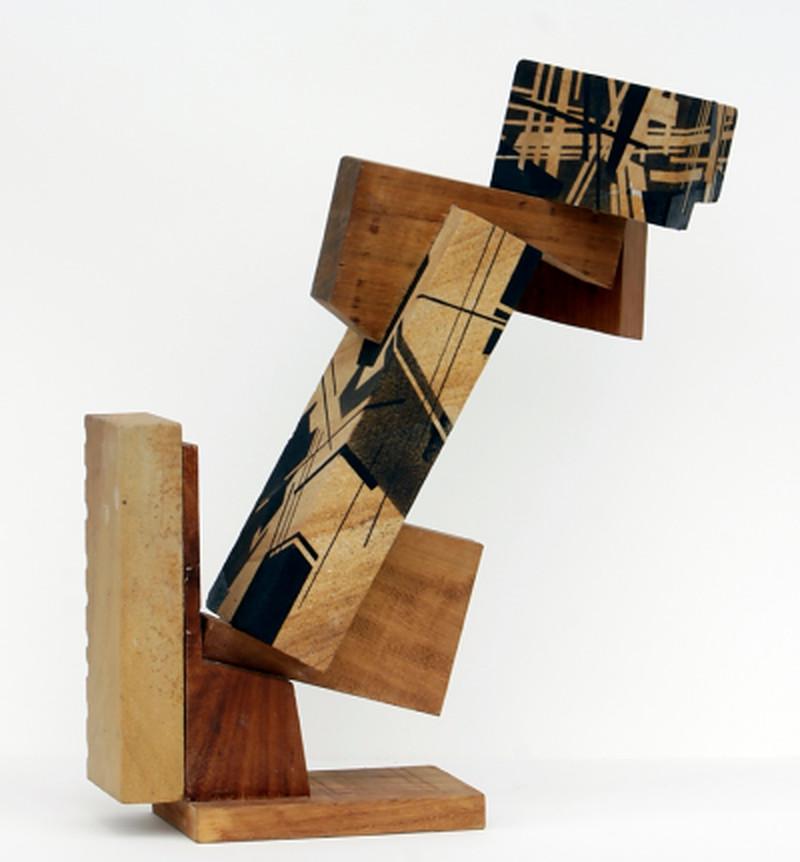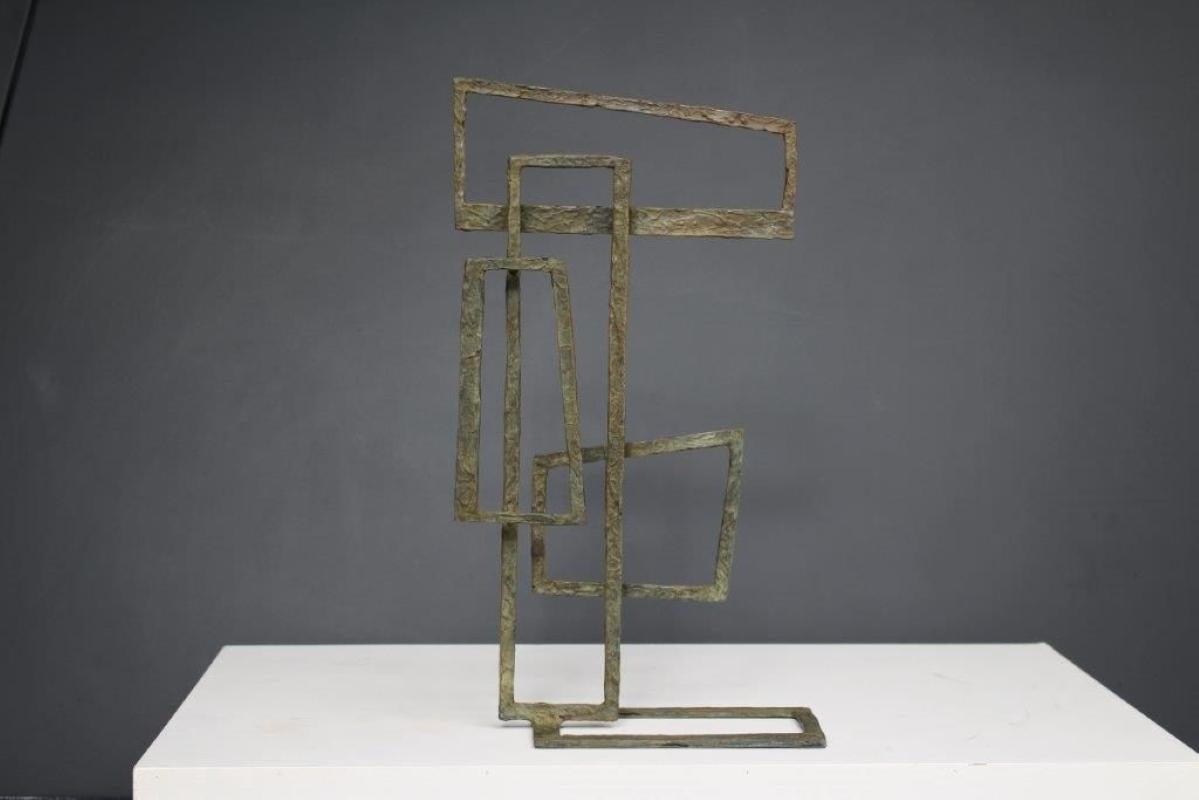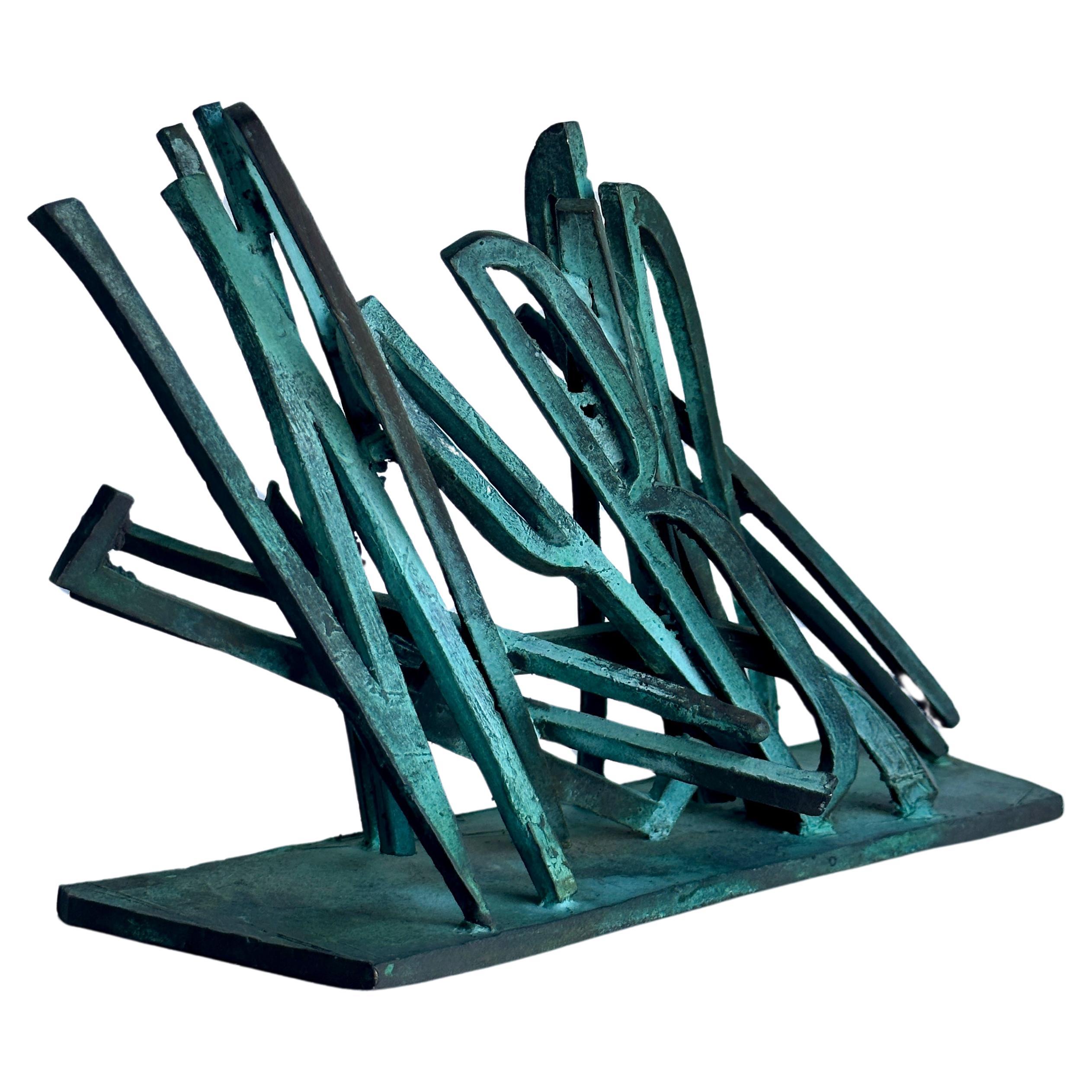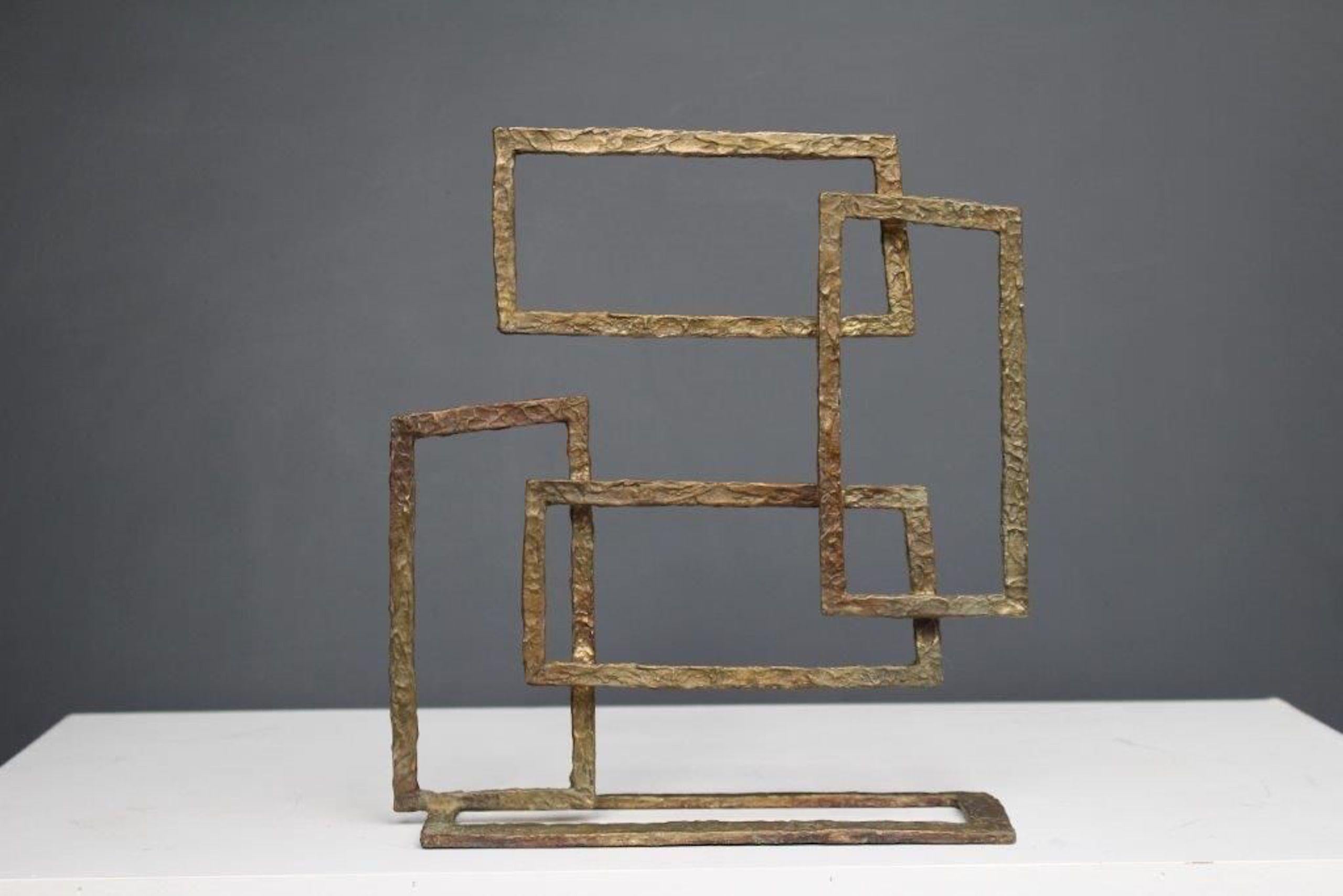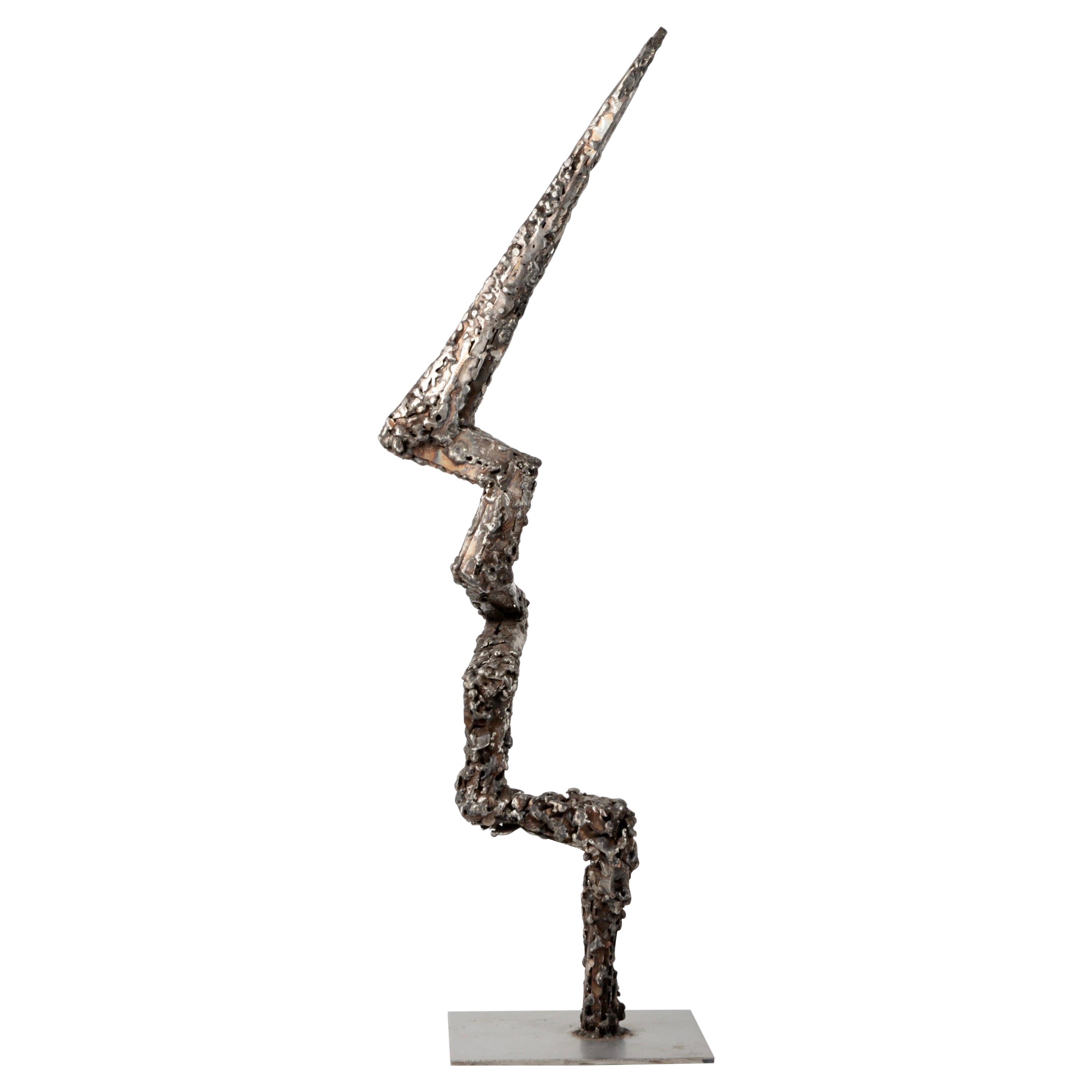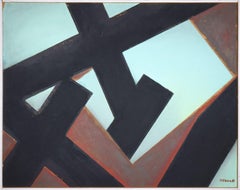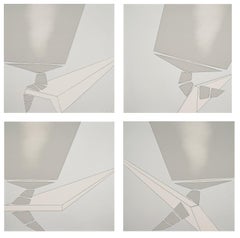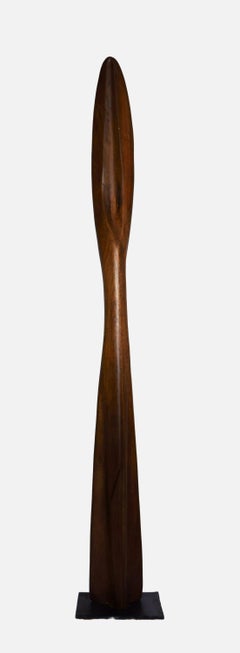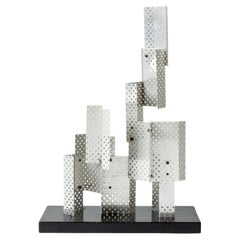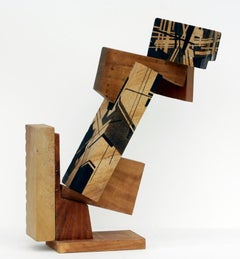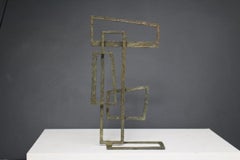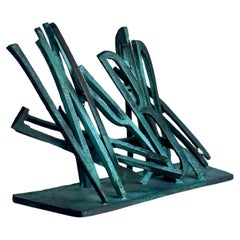Articles similaires à Rotation graduelle / - Dynamic Tectonics
Vous voulez plus d'images ou de vidéos ?
Demander au vendeur plus d'images ou de vidéos
1 sur 9
Thomas RöthelRotation graduelle / - Dynamic Tectonicsc. 2005
c. 2005
4 500 €TVA incluse
À propos de cet article
Thomas Röthel (*1969 Ansbach), Gradual Rotation, around 2005. Steel with rust patina mounted on stone plate. Overall dimensions: 38 cm (height) x 34 cm (width) x 27 cm (depth), weight 12.3 kg.
- in excellent condition
- Dynamic Tectonics -
The two equally sized steel blocks appear to have once formed a single block. In combination with the horizontal stone slab, the vertical blocks exude an architectural calm that makes the dynamic action between the steel blocks, now divided into two equal bodies, seem all the more energetic. As if the inherent forces of the block had been released explosively, it is torn open in the middle to form a crescendo.
However, the release of the inner forces has not resulted in the original cuboid splitting into two separate vertical bodies; rather, the two parts are connected by the filigree lines of force and perform an intrinsically balanced balancing act. The dynamics, in turn, flow into an overarching calmness that is, however, supported by a virtuoso structure of tension. The dynamic is by no means at a standstill within the stillness, but is constantly in progress, as can be seen by walking around the sculpture. The processual character of the ongoing event is also illustrated by the film of rust, which - like the release of inner forces - is also a material process.
While Richard Serra creates spaces of tension with his steel sculptures, Thomas Röthel releases the material's internal potential for tension and reveals the dynamic order inherent in tectonics. If Serra's sculptures transcend the human scale and thus create a sublime effect, Röthel's steel plates, which float on space-bending lines of force, also unfold a sublime effect.
"Every line, every curve can be calculated in advance with mathematical precision according to the given conditions of the material. And yet there is only one moment of genesis that cannot be grasped by the mind, in which a simple block of steel becomes a work of art beyond mathematics and physics. In the hands of Thomas Röthel, the scientific laws inherent in this work of art become poetry in form.
- Erich Schneider
About the artist
After training as a wood sculptor from 1986 to 1989, Thomas Röthel studied at the Academy of Fine Arts in Nuremberg with Johannes P. Hölzinger. Since then he has worked as a freelance artist in Oberdachstetten.
Röthel mainly creates steel sculptures in his own workshop. Since 2015, he has also been using the production halls of SFG STEELforming GmbH in Burbach in the Siegerland, with whom the American sculptor Richard Serra also works.
Selected Bibliography
Thomas Röthel. Steel Sculptures 1997 - 2008, Edition Kittelberger, Reutlingen 2009.
GERMAN VERSION
Thomas Röthel (*1969 Ansbach), Graduelle Drehung, um 2005. Stahl mit Flugrostpatina auf Steinplatte montiert. Gesamtmaß: 38 cm (Höhe) x 34 cm (Breite) x 27 cm (Tiefe), Gewicht 12,3 kg.
- ausgezeichnet erhalten
- Dynamische Tektonik -
Die zwei gleich großen Stahlquader haben offensichtlich einmal einen einzigen Block gebildet. Im Verbund mit der horizontalen Steinplatte strahlen die vertikalen Quader eine architektonische Ruhe aus, die das dynamische Geschehen zwischen den nunmehr in zwei gleichgroße Körper zerteilen Stahlquader umso energetischer erscheinen lassen. Als ob dem Block innewohnende Kräfte explosionsartig freigesetzt worden wären, ist er ist mittig zu einem Formcrescendo aufgerissen.
Das Ausagieren der inneren Kräfte hat jedoch nicht dazu geführt, dass der ursprüngliche Quader in zwei voneinander getrennte Vertikalkörper separiert worden wäre, vielmehr sind beide Teile durch die filigranen Kraftlinien aneinandergebunden und vollführen einen in sich austarierten Balanceakt. Die Dynamik mündet wiederum in eine übergeordnete Ruhe ein, die allerdings durch ein virtuoses Spannungsgefüge getragen wird. Die Dynamik ist innerhalb der Ruhe keineswegs stillgestellt, sondern beständig im Gange, was sich im Umgehen der Skulptur offenbart. Das Prozessuale des andauernden Geschehens wird auch durch den Flugrost veranschaulicht, der – wie das Freisetzen der inneren Kräfte – ebenfalls ein Materialprozess ist.
Schafft Richard Serra mit seinen Stahlskulpturen Spannungsräume, so setzt Thomas Röthel das materialinterne Spanungspotenzial frei und offenbart das der Tektonik innewohnende dynamische Ordnungsgefüge. Übersteigen Sierras Skulpturen das menschliche Maß und erzeugen dadurch eine Erhabenheit, entfalten auch Röthels auf raumverkrümmenden Kraftlinien schwebende Stahlplatten eine Erhabenheitswirkung.
„Jede Linie, jede Krümmung ist gemäß den gegebenen Bedingungen des Materials mit mathematischer Genauigkeit vorher berechenbar. Und doch gibt es nur einen mit dem Verstand eben nicht fassbaren Moment der Genese, bei dem aus einem schlichten Stahlblock ein Kunstwerk jenseits von Mathematik und Physik wird. Unter den Händen von Thomas Röthel werden die diesem innewohnenden naturwissenschaftlichen Gesetzmäßigkeiten zur Gestalt gewordenen Poesie.“
- Erich Schneider
zum Künstler
Im Anschluss an eine Ausbildung zum Holzbildhauer von 1986 bis 1989 studierte Thomas Röthel an der Kunstakademie Nürnberg bei Johannes P. Hölzinger. Seitdem ist er in Oberdachstetten als freischaffender Künstler tätig.
Röthel kreiert vorwiegend Stahlskulpturen, die er in der eigenen Atelier-Werkstatt anfertigt. Seit 2015 nutzt er zudem die Produktionshallen der SFG STEELforming GmbH in Burbach im Siegerland, mit der auch der amerikanische Bildhauer Richard Serra zusammenarbeitet.
Auswahlbibliographie
Thomas Röthel. Stahlskulpturen 1997 - 2008. Edition Kittelberger, Reutlingen 2009.
- Créateur:Thomas Röthel (1969, Allemand)
- Année de création:c. 2005
- Dimensions:Hauteur : 38 cm (14,97 po)Largeur : 34 cm (13,39 po)Profondeur : 27 cm (10,63 po)
- Support:
- Mouvement et style:
- Période:
- État:
- Adresse de la galerie:Berlin, DE
- Numéro de référence:1stDibs : LU2438215572132
À propos du vendeur
5,0
Vendeur professionnel agréé
Chaque vendeur répond à des normes strictes en matière d'authenticité et de fiabilité
Établi en 2014
Vendeur 1stDibs depuis 2023
21 ventes sur 1stDibs
- ExpéditionRecherche du devis...Expédition depuis : Berlin, Allemagne
- Politique des retours
Certaines parties de cette page ont été traduites automatiquement. 1stDibs ne garantit pas l'exactitude des traductions. L'anglais est la langue par défaut de ce site web.
Garantie d'authenticité
Bien qu'il soit peu probable que la situation se présente, dans le cas où vous rencontreriez un problème d'authenticité d'un article, contactez-nous dans un délai d'un an pour obtenir un remboursement intégral. DétailsGarantie de remboursement
Si votre article n'est pas conforme à la description, est endommagé pendant le transport ou ne vous est pas livré, contactez-nous sous 7 jours pour obtenir un remboursement intégral. DétailsAnnulation sous 24 heures
Vous disposez d'un délai de 24 heures pour annuler votre achat sans motif.Des vendeurs professionnels agréés
Nos vendeurs de renommée mondiale doivent respecter des normes strictes en matière de service et de qualité, afin de préserver l'intégrité de nos fiches produit.Garantie d'alignement des prix
Si vous constatez qu'un autre vendeur a mis en vente le même article à un prix inférieur sur un autre site, nous nous alignerons sur ce prix.Livraison en toute confiance à l'international
Notre réseau de transporteurs de premier ordre propose des options d'expédition spécialisées dans le monde entier, y compris des livraisons personnalisées.Plus d'articles de ce vendeur
Tout afficherTension Tectonique / - Archetypes de peinture -
Jürgen Möbius (*1939 Großenhain), Tension tectonique. Huile sur panneau dur, 47,5 x 60 cm, 49 x 61,5 cm (cadre), signée en bas à droite "Möbius" et datée "[19]81".
- Le coin supérie...
Catégorie
années 1980, Abstrait, Peintures - Abstrait
Matériaux
Huile
1 120 € Prix de vente
20 % de remise
Sans titre / - Sculpture dansante -
Par Gerlinde Beck
Gerlinde Beck (1930 Stuttgart-Cannstatt - 2006 Mühlacker-Großglattbach), Sans titre, 1973. Série de quatre sérigraphies, 29,8 cm x 29,8 cm, chacune signée au plomb au recto et numéro...
Catégorie
Années 1970, Géométrique abstrait, Estampes - Abstrait
Matériaux
Papier
Forme végétale / - Grown Art
Paul Dierkes (1907 Cloppenburg - 1968 Berlin), Forme végétative. Acajou, 1958. 142 x 16 x 10 cm (sculpture), 21 x 17,5 cm (socle), monogrammé "PD" au verso.
- Grown Art -
Outre...
Catégorie
années 1950, Après-guerre, Sculptures - Abstrait
Matériaux
Acajou
2 800 € Prix de vente
20 % de remise
Sans titre / - L'archaïsme de la nature -
Jorge Machold (1940 Chemnitz - 2015 Berlin), Sans titre, 1973. Gravure en couleur, 41,5 x 29,2 cm (format de la plaque), 49,5 cm x 39,5 cm (format de la feuille), signée en bas à dro...
Catégorie
années 1970, Abstrait, Estampes - Abstrait
Matériaux
Papier
Collage avec application métallique / - Rhythm and Reflection
Hermann Goepfert (1926 Bad Nauheim - 1982 Anvers), Collage avec application de métal, 1965. Contribution n° 14 de l'anthologie "La lune en rodage II" publiée par les Editions Panderm...
Catégorie
années 1990, Abstrait, Technique mixte
Matériaux
Papier
Animal rare / - Figuration abstraite -
Veit Hofmann (*1944 Dresde), Rare Animal, 1987. Huile sur carton léger, 42 cm (hauteur) x 30 cm (largeur), monogrammé "V[eit]H[ofmann]" en bas à droite et daté "[19]87", titré "Selte...
Catégorie
années 1980, Expressionnisme abstrait, Peintures - Abstrait
Matériaux
Huile
Suggestions
Sculpture de Lars Erik Falk, Suède, 1968
Par Lars Erik Falk
Sculpture étonnante de Lars Erik Falk, réalisée en aluminium perforé. Les différents angles créent un magnifique jeu de lumière.
Catégorie
Vintage, années 1960, Scandinave moderne, Sculptures - Abstrait
Matériaux
Aluminium
Equilibrio Arquitectonico III, 2009
Le peintre et sculpteur Martín Carral a étudié les beaux-arts à l'université de Barcelone. Carral peint depuis de nombreuses années les ondes gravitationnelles, un univers en expansi...
Catégorie
XXIe siècle et contemporain, Moderne, Sculptures - Abstrait
Matériaux
Technique mixte
Composition IV de Delphine Brabant - Sculpture géométrique abstraite en bronze
Par Delphine Brabant
Composition IV est une sculpture en bronze de l'artiste contemporaine Delphine Brabant, dont les dimensions sont de 48 × 24 × 12 cm (18,9 × 9,4 × 4,7 in).
La sculpture est signée et...
Catégorie
années 2010, Contemporain, Sculptures - Abstrait
Matériaux
Bronze
Sculpture d'Alphabet en bronze de Sharbek Almajkov
Cette sculpture en bronze "alphabet penché" est signée par l'artiste, qui était connu sous son prénom mais aussi sous un nom d'emprunt ; il se faisait appeler Sharbek Almajkov. Nous ...
Catégorie
Fin du 20e siècle, Américain, Moderne, Sculptures - Abstrait
Matériaux
Bronze
Composition V de Delphine Brabant - Sculpture géométrique abstraite en bronze
Par Delphine Brabant
Composition V est une sculpture en bronze de l'artiste contemporaine Delphine Brabant, dont les dimensions sont de 33 × 30 × 11 cm (13 × 11.8 × 4.3 in).
La sculpture est signée et n...
Catégorie
années 2010, Contemporain, Sculptures - Abstrait
Matériaux
Bronze
Torsten Treutiger (1932-2019), sculpture PROFIL II
Sculpture en acier, "PROFIL II", de l'artiste suédois Torsten Treutiger. Signé et marqué avec les informations de l'artiste ainsi que le prix fixé par l'artiste sur l'œuvre. Ca 1990/...
Catégorie
Début des années 2000, Suédois, Postmoderne, Sculptures - Abstrait
Matériaux
Acier inoxydable
